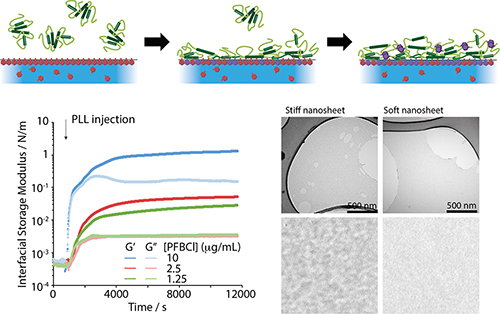ProLiCell

ProLiCell - Engineering of Protein Nanosheets for Stem Cell Technologies

ProLiCell is an ERC-funded project focusing on the design of protein nanosheets to develop bioemulsions for stem cell technologies.
A long standing dogma in the field of cell-based technologies is that bulk mechanical properties of solid substrates are essential to enable cell spreading, proliferation and fate decision. The use of solid materials to culture adherent cells constitutes an important hurdle for the scale up, automation and speed up of cell culture and recovery. Our recent results show that bulk solid substrates are not necessary to promote cell adhesion, growth and fate regulation as adherent stem cells spread and proliferate readily at the surface of ultra-soft materials, even liquids. In such cases, cell adhesion is enabled by the formation of a mechanically strong layer (nanosheet) of proteins at the interface between the oil (liquid substrate) and aqueous medium. This key discovery opens the door to the engineering of protein nanosheets enabling the use of liquid, free-flowing substrates sustaining cell adhesion, expansion, isolation and recovery.
ProLiCell will design the biochemical and mechanical properties of extracellular matrix (ECM) protein nanosheets that can sustain the formation of adhesion protein complexes and support cell proliferation and culture on materials with very weak bulk mechanical properties (liquids). The engineered ECM nanosheets will be applied to: 1. the design of 3D bioreactors based on emulsions, for the culture of stem cells; 2. the formation of stem cell sheets at oil-water interfaces for tissue engineering; 3. the isolation and purification of stem cells using emulsions presenting antibody-adsorbed interfaces. ProLiCell will provide fundamental insights into ECM nanosheet design and advance our understanding of the mechanisms via which cells adhering to such interfaces sense and respond to nanoscale cues. Such fundamental understanding will enable liquid-liquid platforms to transform stem cell technologies by borrowing a wider range of processing and manufacturing concepts to the field of Chemical Engineering.

Protein nanosheet self-assembly regulates interfacial mechanics. Proposed mechanisms regulating nanosheet assembly. Example of in situ interfacial rheology characterising nanosheets with increasing shear moduli. TEM images of stiff and soft protein nanosheets transfered via Langmuir-Blodgett deposition.
Engineering Interfacial Mechanics of Liquid-Liquid Interfaces
A central point of focus to ProLiCell is the understanding of parameters regulating the self-assembly of protein or polymer nanosheets and controlling corresponding interfacial mechanics. This requires the development of novel methodologies to precisely characterise interfacial mechanics (including interfacial rheology, interfacial stress relaxation, interfacial creep micro-rheology, AFM indentation), as well as the nanoscale morphology of associated assemblies (Langmuir-Blodgett deposition from Liquid-Liquid interfaces, TEM, AFM, neutron reflectometry).
This project not only investigates the role of macromolecular structure on self-assembly and mechanics (e.g. the role of crosslinking and denaturation), but also the impact of biofunctionalisation of corresponding nanosheets. Therefore we have developed system that enable us to dissociate interfacial mechanics (protein nanosheet scaffolds), from their bioactivity (promoting cell adhesion and biomimicry).

Stem cell culture on bioemulsions. Protein nanosheet technologies can be used to stabilised microdroplets, enabling the culture of stem cells. This allows the growth of mesenchymal stem cells on emulsions, with excellent retention of stem cell marker expression and high overall levels of cells positive for triple markers (CD73, CD90 and CD105). Primary keratinocytes and other stem cells adhere to liquid interfaces via integrin binding, form focal adhesions and assemble mature actin cytoskeletons. Cell sheets assemble at 2D liquid-liquid interfaces and develop a contractile basal actin cytoskeleton, confirming their mechanical engagement with the supporting liquid-liquid interface.
Design of Protein Nanosheets for Stem Cell Technologies
To a large extent, the phenotype of adherent stem cells is regulated by cell adhesion to the extra-cellular matrix (ECM) via transmembrane receptors of the integrin family. This mechanically couple the ECM to the actin cytoskeleton, via adapter proteins such as talin and vinculin. ProLiCell initial focus aimed to confirm that this machinery is also regulating cell adhesion at liquid-liquid intefaces and that protein nanosheet mechanics allow to modulate such interactions. However, much remain unknown of the detailed molecular mechanism regulating signalling at such soft interfaces and the detailed role of protein nanosheet multiscale mechanics on regulating integrin-mediated adhesions. This is an area of particular interest to ProLiCell.
In turn, ProLiCell is exploring how liquid-liquid systems, through the development of microdroplet technologies, stabilised by protein nanosheets, bioemulsions, will enable to revolutionise adherent cell manufacturing, from the production of stem cell sheets for tissue engineering applications, to the scale up of stem cell expansion in 3D bioreactors, to the high throughput screening of adherent cell colonies.
Selected References
Kong, D.; Megone, W.; Nguyen, K.D.Q.; Di Cio, S.; Ramsted, M. and Gautrot, J.E. “Protein nanosheet mechanics controls cell adhesion and expansion on low-viscosity liquids”. Nano Letters 2018, 18 (3), 1946-1951.
Kong, D.X.; Peng, L.H.; Di Cio, S.; Novak, P. and Gautrot, J.E. “Stem cell expansion and fate decision on liquid substrates are regulated by self-assembled nanosheets” ACS Nano 2018, 12 (9), 9206-9213.
Kong, D.; Nguyen, K.D.Q.; Megone, W.; Di Cio, S.; Peng, L. and Gautrot, J.E. “The culture of HaCaT cells on liquid substrates is mediated by a mechanically strong liquid-liquid interface”. Faraday Discussions 2017, 204, 367-381.
Megone, W.; Kong, D.; Peng, L.; Gautrot, J.E. " Extreme reversal in mechanical anisotropy in liquid-liquid interfaces reinforced with self-assembled protein nanosheets" J. Colloid Interface Sci. 2021, 17 (594), 650-657.


